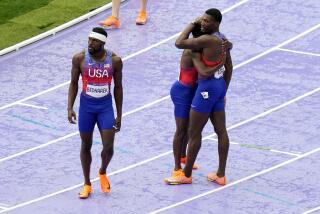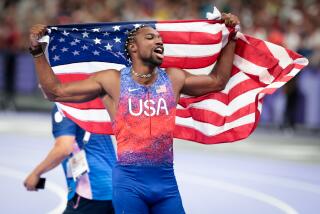Setting Straight ‘Fastest Man’ Record
- Share via
TORONTO — Who’s the world’s fastest man? Mike Leskiw and many other Canadians are fed up hearing U.S. television commentators answer that question with the name Michael Johnson, the American who won the 200 and 400 meters at the Atlanta Olympics. They say it’s Donovan Bailey, Canada’s gold medalist in the 100.
So Leskiw, an automobile body shop owner in Niagara Falls, Ontario, has become something of a national hero after dipping into his vacation savings to launch a stateside publicity counteroffensive, beginning with a full-page advertisement next week in the edition of USA Today that circulates in Dallas, where Johnson lives.
The ad, mostly paid for by Bailey’s local newspaper, the Oakville Beaver, will read: “Come visit the hometown of the world’s fastest man--Oakville, Ontario. (Sorry Michael J.)”
Leskiw found instant adulation after his campaign was featured on television news. When he walked into his bank Wednesday morning, he got a standing ovation. There were so many telephone interview requests from Canadian--and American--reporters that he had to close his body shop for two days. Even talk-show host David Letterman wanted him.
“I’m just an average guy, but I said something everybody was feeling,” Leskiw said.
Traditionally, the winner of the Olympic 100-meter race is called the world’s fastest human. But this year, beginning with NBC’s Olympic coverage, that phrase has been used often in the U.S. media to describe Johnson, who became the first man to win gold medals in the 200 and 400 in the same Olympics, setting a world record of 19.32 seconds in the 200.
Like most Canadians, Leskiw sees the American networks on cable, and he heard the appellation applied to Johnson during the Games and afterward.
Frustrated, Leskiw began looking for ways to make his complaint heard south of the border. “Donovan did something really good and he made us all proud here,” Leskiw said. “I don’t like to see that tarnished. . . . He ought to get everything that’s coming to him.”
Bailey’s world record 9.84-second victory in the 100, and his subsequent anchor leg on the gold-medal-winning 400-meter relay team resonated deeply in Canada because for many it erased the embarrassment of Ben Johnson’s disqualification in the 1988 Seoul Olympics when it was discovered Johnson had used performance-enhancing drugs.
“I remember Ben Johnson,” Leskiw said. “Like all Canadians, I felt that high, and then I felt the low. Donovan gave us the high again.
“We’re just the little guys up north. I think the American people usually are generous in defeat, but they’re not showing that side to us right now.”
For the USA Today ad, Leskiw withdrew $735 from the bank--half the amount he and wife Vicky had set aside for a Las Vegas vacation to celebrate their wedding anniversary. The trip, he said, “has gone on the shelf.”
Ian Oliver, publisher of the Oakville Beaver, which paid the rest of the $3,218 price of the ad, said the paper has received more than 20 calls from readers offering donations up to $1,000 and that more advertisements across the United States are planned.
Many of the callers still are angry about what they consider NBC’s jingoistic Olympic coverage, Oliver said, adding that the decision to name Johnson the world’s fastest man is typical.
“It’s always been that the man who won the 100 is the world’s fastest, but as soon as the Americans don’t win, it changes,” Oliver said.
More to Read
Go beyond the scoreboard
Get the latest on L.A.'s teams in the daily Sports Report newsletter.
You may occasionally receive promotional content from the Los Angeles Times.






